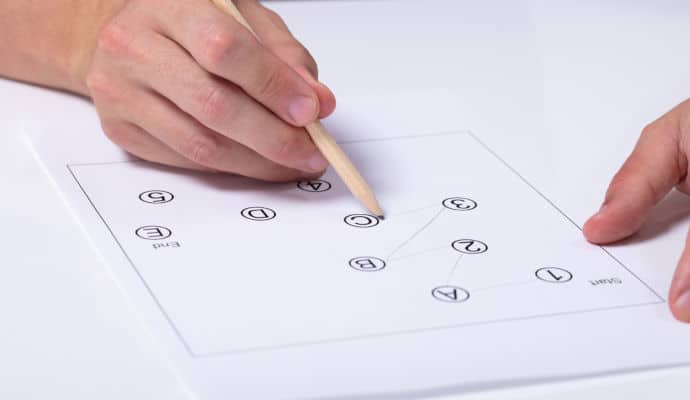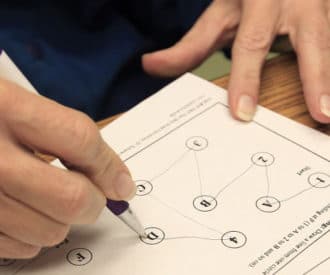
A more sensitive screening test for dementia
If you suspect that your older adult could be showing signs of cognitive impairment and not just having moments of normal forgetfulness, the first step is to visit their primary doctor for a full check-up.
If there aren’t any obvious causes of dementia-like symptoms, the doctor might use a test called the Mini Mental Status Exam (MMSE) to screen for possible cognitive issues.
However, there’s a more sensitive, but less commonly used, screening test called the Montreal Cognitive Assessment (MoCA).
We explain how the MoCA test works, when it’s used, and how it's similar to and different from the Mini Mental Status Exam (MMSE).
How the Montreal Cognitive Assessment (MoCA) works
The Montreal Cognitive Assessment (MoCA) is a one page, 30 point test that takes about 10 minutes.
The MoCA usually tests these cognitive areas:
- Ability to process and understand visual information about where objects are
- Executive functions – ability to manage cognitive processes
- Language
- Short-term memory recall
- Attention
- Concentration
- Working memory
- Awareness of time and place
How are the MoCA and MMSE different?
The MoCA looks similar to the MMSE, but the MoCA tests a variety of different cognitive functions and the MMSE focuses mostly on memory and recall.
The MoCA is generally better at detecting mild impairment and early Alzheimer’s disease because it’s a more sensitive test and is more challenging.
So, if a doctor sees a patient who is questioning their mental functioning, they might give the MoCA test.
But if a patient comes in and is clearly cognitively impaired, a very sensitive test wouldn’t be as necessary since the issues are more obvious.
The MoCA has also been shown to be a better screening tool for conditions like:
- Parkinson’s disease
- Vascular dementia
- Traumatic brain injury (often from falls)
- Huntington’s disease
- Brain tumors
- Multiple sclerosis
How are the MoCA and MMSE similar?
Even though these are good screening tools for cognitive impairments, neither test was designed to diagnose cognitive conditions.
They’re both initial screening tests that are used to determine whether further cognitive testing is needed.
They also can’t be used to distinguish between conditions.
For example, you couldn’t use either test to diagnose someone with Alzheimer’s disease versus frontotemporal dementia. After the initial screening, more testing would be needed.
Next Step Find out how the Mini Mental Status Exam (MMSE) works
Recommended for you:
- SAGE Test: 15 Minute At-Home Test for Alzheimer’s
- The Mini Mental Status Exam: A Dementia Screening Tool
- Testing for Dementia: Why the Mini Mental Status Exam Isn’t Enough for Diagnosis
By DailyCaring Editorial Team
Sources: MoCA, Wikipedia, Today’s Geriatric Medicine
This article wasn’t sponsored and doesn’t contain affiliate links. For more information, see How We Make Money.
[optin-monster slug=”yxbytm35zhsdfopnw7qk”][optin-monster slug=”jvhyplxmb4umsjazxecn”]
About the Author

Connie Chow
Connie was a hands-on caregiver for her grandmother for 20 years. (Grandma made it to 101 years old!) She knows how challenging, overwhelming, and all-consuming caring for an older adult can be. She also knows how important support is — especially in the form of practical solutions, valuable resources, and self-care tips.





I wanted to see a copy of the MOCA test.
In the article above, there are a couple of links to the MoCA website, which has the test. Here’s a direct link – https://www.mocatest.org/
the MOCA Does need training to have diagnostic accuracy . You need to revise your advice on this test. Please check with the authors of this test.
This website is otherwise excellent and i recommend it to all my caregivers who face issues. Do please adjust your stance on the MOCA .
Thanks very much for alerting us to this change! We’ve now updated the article to remove that statement. (We had been using older information from the MoCA site, which has since been updated.)
What does a score of 23 mean on this test? Alzheimers????
No, it absolutely does not mean that someone has Alzheimer’s or dementia.
This is a screening test only and MUST be interpreted by a doctor. It does not diagnose anything. What the score means is that someone needs to be evaluated for any potential cognitive issues. There are many TREATABLE health conditions that could cause these types of symptoms, which is why it’s so important to see a doctor and find out the true cause of the issue. Even something as simple and easily treatable as a urinary tract infection can cause alarming cognitive changes.
Here’s more information about a variety of treatable health conditions that could cause temporary cognitive impairment:
— Is It Alzheimer’s or a Urinary Tract Infection? https://dailycaring.com/alzheimers-or-urinary-tract-infection/
— 7 Treatable Health Conditions with Symptoms Similar to Dementia https://dailycaring.com/7-treatable-health-conditions-with-symptoms-similar-to-dementia/
— 8 Treatable Diseases That Mimic Dementia https://dailycaring.com/8-treatable-diseases-that-mimic-dementia/
Here’s information about what needs to happen in order to get an accurate diagnosis of Alzheimer’s or dementia — How Is Dementia Diagnosed? A Geriatrician Explains https://dailycaring.com/how-is-dementia-diagnosed-a-geriatrician-explains/